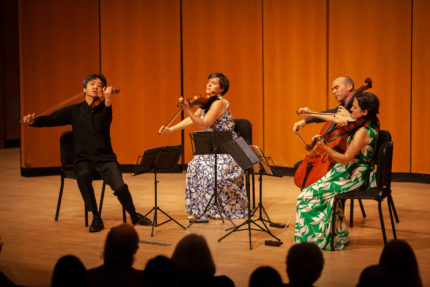Jupiter Quartet ends Winter Chamber festival on the right note

Seasoned Chicagoans know that concertgoing in January can be like foraging: those keen of sense and stout enough to brave the mire — in this case, the weather — find the chestnuts.
A comparatively mild Chicagoland winter (so far) has required less grit than usual from classical music fans, and a smattering of snowfall on Sunday afternoon thankfully didn’t deter a hearty audience from turning up at Northwestern University’s Pick-Staiger Concert Hall. The reward for the trek to Evanston was a mostly winning farewell to this year’s Winter Chamber Music Festival, with a popular past guest, the Jupiter String Quartet, closing it out.
The Jupiter Quartet is no stranger to the festival, or to the region since the ensemble’s 2013 debut at the University of Chicago Presents series. Despite a decade as artists in residence downstate, at the University of Illinois Urbana-Champaign, violinists Nelson Lee and Meg Freivogel, violist Liz Freivogel (Meg’s sister), and cellist Daniel McDonough visit just infrequently enough to make it a noteworthy occasion.
Sunday’s concert marked a genial if uneven return, starting with Mozart’s Quartet in F Major, K. 950, the last of the composer’s three “Prussian” quartets. The Allegro moderato set the tone for the performance with verve and a balanced ensemble dynamic, but while the group moments shined, individual intonation issues in solo passages intruded.
Mozart’s tentative, almost childlike main theme for the beginning of the Andante was imbued with a sense of contemplative resonance, in suitable contrast to the vivacious first movement. The Minuetto, better still, was lifted by a mature sense of pacing despite a bright tempo, but the ensuing Allegro finale struggled to find its footing through waves of articulated sixteenth-note runs.
Composed for the cello-playing King Frederick William II of Prussia, Mozart’s quartet spotlights that instrument in both solos and key bass roles. Cellist McDonough consistently excelled in these features, ripping through the piece’s most virtuosic passages with aplomb and lending resonant ballast to the most satisfying cadences of the work.
McDonough was equally adroit as emcee when he stepped to the microphone to introduce an impromptu suite of American music featuring works by Florence Price and William Bolcom. Five Folksongs in Counterpoint has emerged as a popular selection amid the renaissance of Price’s music in recent years, and the Jupiter Quartet made a valiant case for its inclusion in the canon in this performance.
(McDonough, citing a misprint in the handbill, clarified that the ensemble would play only the middle three of the printed five movements and noted that the intermission would directly precede the program’s final work.)
The musicians beautifully disentangled the second movement, “Clementine,” allowing the instantly recognizable melody to float to the surface even as it buffeted about on the currents of Price’s dense harmony. The ensemble was equally committed in the more straight-ahead “Drink to Me Only with Thine Eyes” and brief yet spirited “Shortnin’ Bread,” which was propelled by the second violin’s fierce pizzicato backbeat.
Two rags for string quartet by William Bolcom, whose innovative compositions helped revitalize the genre in the 1970s, rounded out the set. The melancholic, lilting “Graceful Ghost” was more “playful poltergeist” in the Jupiters’ reading, which leaned into the swung meter and played up the cheekier elements of the otherwise deft arrangement. Similar choices were better suited to the zippy “Incineratorag,” though a mixture of unsurety around the tempo and an exaggerated interpretation toed the line between campiness and mere fun.
After intermission, Brahms’ String Quartet No. 2 found the musicians more in their element, demonstrating their narrative prowess and unfolding the sonata form of the Allegro non troppo with the naturalistic drama of gifted storytellers. The second movement was rendered with particularly sensitive care; highlighting gorgeous incantations by first violinist Lee, the ensemble’s burnished, amber-hued sound flourished in Brahms’ lavish music.
The third movement, which opens with a minor-key theme backed by hurdy-gurdy-like drones in the cello, was a clear bright spot. The ensemble handily dispatched the sprightly trio, which stands in quirky juxtaposition to the minuetto’s rustic-sounding introductory motif.
This proved a mere foretaste for the barnstorming Finale, a ripping sonata-rondo that the Jupiter Quartet played with the most style and coordination of any of the program’s up-tempo numbers. It was a sendoff that brought a cheering audience to its feet and let everyone go home with a warm glow.
Posted in Uncategorized




